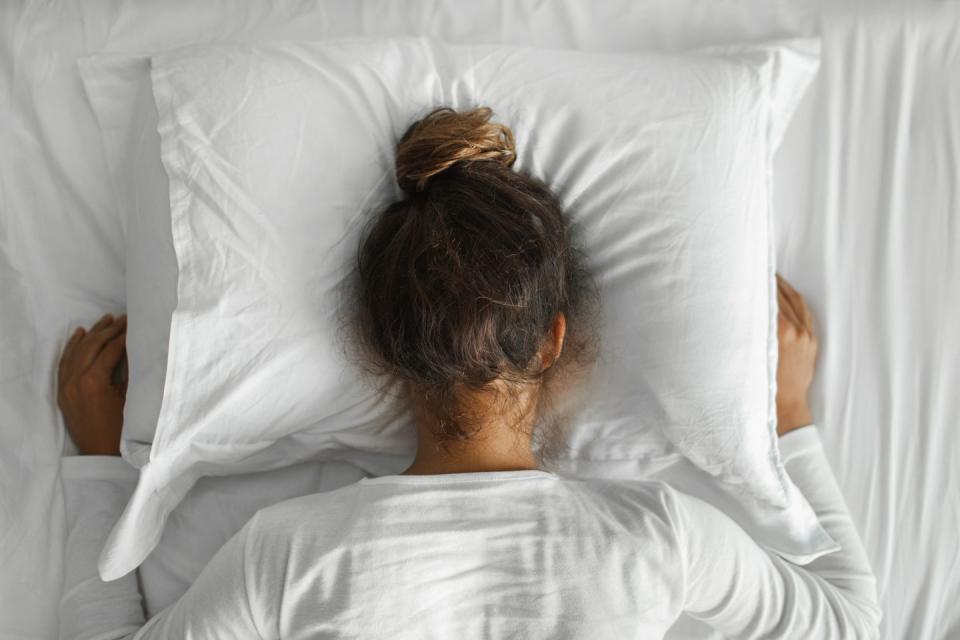Suffering with the Sunday scaries? You're not alone

Monday is the worst day of the week, right? Even if you love your job, most of us struggle to crawl out of bed after a weekend off.
But do you dread Monday so much you struggle to enjoy your weekend? Or get a serious case of the blues the night before? Then it's possible you're dealing with the 'Sunday scaries'.
A relatively new phrase, at least in popular discourse, the feelings described by the term are anything but. Ask around any office and everyone will know what you mean when you discuss that Sunday low-feeling. But if the dread is seriously impacting your life, it could be time to do something about it.
Here's everything you need to know about the Sunday scaries, plus the steps you can take to help alleviate your stress.
What does Sunday scaries mean?
Okay, so, 'Sunday scaries' might mean something different to different people, but generally speaking, the term refers to work-related anxiety that kicks in ahead of the work week, explains psychologist Tobba Vigfusdottir.
Vigfusdottir is also CEO and founder of Kara Connect (an employee mental health and wellbeing platform), which is witnessing the real-time consequences faced by stressed employees.
"At Kara Connect, we actually see an uptick in workers seeking professional help on Sunday and Monday morning, showing that the phenomenon is all too real," says Vigfusdottir.
Of course, work-related anxiety can never be a good thing, but it's especially worrying considering work pressure is driving high levels of burnout among Gen Z and millennial employees, according to Deloitte.
"In my view, this is something all employers should be aware of. Even if people joke online about ‘the Sunday Scaries’, the widespread use of such a term means that many people are - at least on some level - frequently feeling concerned about their working week before it’s even begun, which is certainly not a good situation for employees to be in,” comments Vigfusdottir.
What causes Sunday scaries?

So, what's behind this phenomenon? And, when might these feelings be cause for concern? Well, it's not super straightforward given lots of workers feel tempted to snooze their alarm come Monday morning.
Moreover, it's natural to feel apprehensive toward the end of the weekend, says Dr Tara Quinn-Cirillo, Associate Fellow British Psychological Society and HCPC Registered Practitioner Psychologist.
"If we work Monday to Friday, we may associate the weekends with relaxation and freedom from the routines and demands of the working week," points out Dr Quinn-Cirillo. "If we are in a demanding job or currently under pressure there may be natural apprehension about the working week commencing again."
You could also be dealing with work-related stress (which is usually associated with a short-term event according to Dr Quinn-Cirillo). For instance, you might feel nervous ahead of an upcoming meeting or presentation.
"However, if we observe a continual pattern of feeling anxious over continual weekends before we go back to work - this could be a sign that something wider is at play," continues Dr Quinn-Cirillo. "Job satisfaction, anxiety or other life issues could be at play."
If this sounds familiar, you might find it helpful to monitor your feelings and any patterns at play, suggests Dr Quinn-Cirillo. For instance, you may notice you're feeling stressed over more weekends, or perhaps the intensity of your feelings is increasing. If you are at all concerned about how you feel then contact your GP, the expert advises. "It is important not to sit on your feelings and not hold them to yourself."
How to beat the Sunday scaries

As Dr Quinn-Cirillo points out, it's important to share any concerns with your GP. Remember, you don't have to deal with these feelings alone, and you'll likely want to raise the topic with people who can help at work, too.
If you don’t feel you can talk to a trusted person at work, it's worth finding someone outside of work you can confide in first, says Dr Quinn-Cirillo. "This may help you then feel more confident to approach your work about how you feel."
What's more, a good boss will want to help and support you once made aware of what's going on. To be clear, you're doing nothing wrong by asking for help.
“Employees need to feel supported, especially if they are going through a particularly challenging period of time, or working on a project that is pushing them towards their limits. They also need to know that when they speak up and ask for support, there are effective systems in place which will help them get the assistance they need, tailored to their exact situation.
"It’s not only about providing support at the moment when it is most needed, but having a holistic approach to employee wellbeing which means that employees know there is support, and where to turn for it, at all times," says Tobba Vigfusdottir.
And, while speaking to your GP and your employer should be your first port of call, there are other steps you may find helpful when it comes to battling the Sunday scaries.
According to Dr Quinn-Cirill, you should ask yourself:
Is there any way you can utilise your autonomy over what your working week looks like? i.e. Can you arrange less stressful tasks for the start of the week?
Can you look at addressing your work satisfaction? Or, if this isn't achievable in the short term: can you look at increasing valued activities and engagement outside of work? i.e. Planning engaging and value based activities.
Can you be more mindful about the activities you engage in at the weekend? i.e. Make sure you hydrate, nourish and keep a good regular sleep schedule as this will also help with anxiety and mood, says Dr Quinn-Cirill.
You Might Also Like


